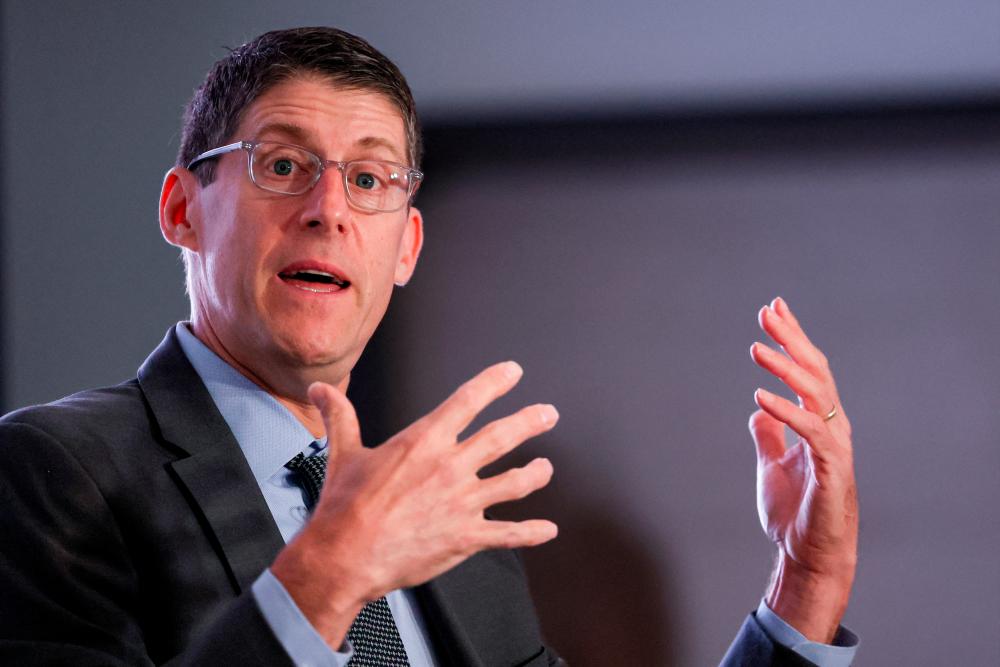NEW YORK: Some of the world’s top investment bankers said on Wednesday (Nov 8) that a drop in corporate dealmaking in 2023 sets the stage for a pick-up in activity once uncertainty around the global economy, geopolitical conflicts and regulatory hurdles subsides.
Global mergers and acquisitions (M&A) totalled US$2 trillion (RM9.36 trillion) in the first nine months of this year, down 27% from a year ago to their lowest level since 2013, according to LSEG data. This has fuelled soul-searching among investment bankers about the prospects for their business.
“CEOs and corporate boards do not need to have a very clear picture of what the future will look like, but they need a degree of stability,” Goldman Sachs Group Inc global M&A co-head Stephan Feldgoise said at a Reuters NEXT conference panel. “I’m reasonably bullish that this will return, but obviously it will be in fits and starts.”
Uncertainty over the Federal Reserve raising interest rates further to fight inflation, the conflicts in the Middle East and Ukraine, concerns about a potential economic slowdown and growing hostility among antitrust regulators to big deals have all weighed on the M&A market. “You can see why some companies are saying, if I don’t have to do this deal now, maybe it is more prudent to wait,” Bank of America chairman of global M&A Steven Baronoff told the panel.
There are green shoots. Last month, oil major Chevron Corp said it would acquire Hess Corp in a US$53 billion deal, less than two weeks after rival ExxonMobil Corp said it would buy Pioneer Natural Resources for US$59.5 billion – the two biggest transactions so far this year.
JPMorgan Chase & Co global M&A head Anu Aiyengar pointed out these two deals were all-stock and said more companies are using their shares as currency to overcome acquisition targets' concerns about locking in a cheap valuation, which they would risk if they sold for cash.
“Our (deal pipelines) are at one of the largest levels that you’ve seen in five-six years. Some (companies) will come out and take the lead,” Aiyengar said.
She added that companies were more willing to battle regulators in court over their deals in light of high-profile legal victories some, such as Microsoft Corp and Illumina Inc, have scored. “Litigation has moved from being an insurance policy to being a strategy,” Aiyengar said.
Centerview Partners investment banking co-president Anthony Kim said that his firm continued to invest in its talent even though it was a tough year for the sector, as it need to make sure it will capitalise when conditions improve.
“Things are improving and we need to plan for the future,” Kim said.
Mizuho’s Americas head of investment and corporate banking Michal Katz, whose bank inked a deal in June to expand in the United States with the US$550 million acquisition of M&A advisory firm Greenhill & Co Inc, said there the challenges in the dealmaking environment offered opportunities to acquirers who can structure deals creatively.
“Complexity creates opportunity. If you are a corporation or a private equity firm that can put together a structure that bridges the gap on valuation, you will be able to get support from your financing partners,” Katz said.
Separately, Goldman Sachs expects dealmaking activity to stay subdued in the medium term as macroeconomic conditions weigh on private equity transactions, an executive said on Wednesday.
“For the medium term, the dealmaking environment will indeed be a little bit less robust,” Jim Esposito, co-head of Goldman’s global banking and markets division, said in an interview at the Reuters NEXT conference.
The private equity industry over the past 18 months to two years has returned a lot less capital to their investors and have found it harder to monetise assets, he said.
“That flywheel of raising money, investing it, returning it, will be less efficient going forward,” Esposito said.
M&A activity globally showed few signs of improvement in the third quarter but a rebound in volumes in the United States – the world’s biggest investment banking market – gave dealmakers hope of a sustained recovery in the near term.
The total value of M&A fell slightly to US$717.4 billion during the September quarter, according to data from Dealogic, from US$738.1 billion last year during the same period.
Equity markets are feeling confident after the latest Federal Reserve meeting, he said. After the central bank kept rates unchanged, some companies decided to sell equity shares, he said.
The Fed earlier this month kept its overnight short-term interest rate target unchanged at between 5.25% and 5.5% and preserved the option to raise rates again as inflation is still well above its 2% target.
For initial public offerings, it will take a while for activity to pick up, with a potential recovery next year.
The trading environment for stocks and fixed income is far more interesting given the interest rate environment, inflation and escalating geopolitical tensions that are fuelling volatility in markets.
“We’re sitting on what is one of the more interesting trading environments in my career,” he said.
Esposito addressed Goldman’s move to scale back its consumer ambitions.
Growing investor scepticism over the business – and US$3 billion of losses – prompted CEO David Solomon to shift Goldman’s focus back to its traditional strengths of investment banking and trading.
The decision to move into consumer banking was made when the world was facing zero interest rates and no bank was earning its cost of capital, Esposito said.
“We realised that’s a hard business that we don’t necessarily have any differentiated or competitive advantage to be in,” he said.
“And so then there was a healthy debate about the sizing and scaling of our consumer ambition. And I think the firm under David’s leadership did something very, very brave.” – Reuters









